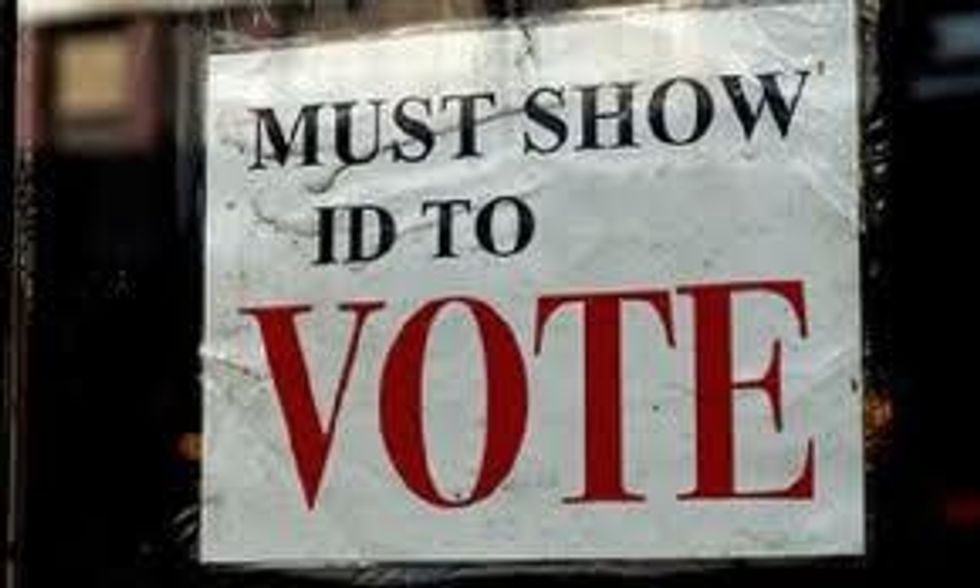Suppose Mitt Romney ekes out a victory in November by a margin smaller than the number of young and minority voters who couldn't cast ballots because the photo-identification laws enacted by Republican governors and legislators kept them from the polls. What should Democrats do then? What would Republicans do? And how would other nations respond?
As suppositions go, this one isn't actually far-fetched. No one in the Romney camp expects a blowout; if he does prevail, every poll suggests it will be by the skin of his teeth. Numerous states under Republican control have passed strict voter identification laws. Pennsylvania, Texas, Indiana, Kansas, Tennessee and Georgia require specific kinds of ID; the laws in Michigan, Florida, South Dakota, Idaho and Louisiana are only slightly more flexible. Wisconsin's law was struck down by a state court.
Instances of voter fraud are almost nonexistent, but the right-wing media's harping on the issue has given Republican politicians cover to push these laws through statehouse after statehouse. The laws' intent, however, is entirely political: By creating restrictions that disproportionately impact minorities, they're supposed to bolster Republican prospects. Ticking off Republican achievements in Pennsylvania's House of Representatives, their legislative leader, Mike Turzai, extolled in a talk last month that "voter ID . . . is gonna allow Governor Romney to win the state of Pennsylvania."
How could Turzai be so sure? The Pennsylvania Department of State acknowledges that as many as 759,000 residents lack the proper ID. That's 9.2 percent of registered voters, but the figure rises to 18 percent in heavily black Philadelphia. The law also requires that the photo IDs have expiration dates, which many student IDs do not.
The pattern is similar in every state that has enacted these restrictions. Attorney General Eric Holder has said that 8 percent of whites in Texas lack the kind of identification required by that state's law; the percentage among blacks is three times that. The Justice Department has filed suit against Southern states whose election procedures are covered by the 1965 Voting Rights Act. It is also investigating Pennsylvania's law, though that state is not subject to some provisions of the Voting Rights Act.
If voter suppression goes forward and Romney narrowly prevails, consider the consequences. An overwhelmingly and increasingly white Republican Party, based in the South, will owe its power to discrimination against black and Latino voters, much like the old segregationist Dixiecrats. It's not that Republicans haven't run voter suppression operations before, but they've been under-the-table dirty tricks, such as calling minority voters with misinformation about polling-place locations and hours. By contrast, this year's suppression would be the intended outcome of laws that Republicans publicly supported, just as the denial of the franchise to Southern blacks before 1965 was the intended result of laws such as poll taxes. More ominous still, by further estranging minority voters, even as minorities constitute a steadily larger share of the electorate, Republicans will be putting themselves in a position where they increasingly rely on only white voters and where their only path to victory will be the continued suppression of minority votes. A cycle more vicious is hard to imagine.
It's also not a cycle calculated to endear America to the rest of the world. The United States abolished electoral apartheid in the 1960s for reasons that were largely moral but were also geopolitical. Eliminating segregation and race-specific voting helped our case against the Soviets during the Cold War, particularly among the emerging nations of Asia and Africa. It's not likely that many, anywhere, would favorably view what is essentially a racially based restriction of the franchise. China might well argue that our commitment to democracy is a sham.
And what should Democrats do if Romney comes to power on the strength of racially suppressed votes? Such an outcome and such a presidency, I'd hope they contend, would be illegitimate -- a betrayal of our laws and traditions, of our very essence as a democratic republic. Mass demonstrations would be in order. So would a congressional refusal to confirm any of Romney's appointments. A presidency premised on a racist restriction of the franchise creates a political and constitutional crisis, and responding to it with resigned acceptance or inaction would negate America's hard-won commitment to democracy and equality.
The course on which Republicans have embarked isn't politics as usual. We don't rig elections by race in America, not anymore, and anyone who does should not be rewarded with uncontested power.

